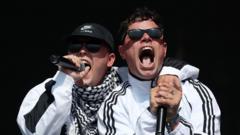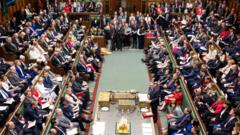Did BBC Overlook a Bigger Glastonbury Controversy?

Understanding the Controversy Surrounding BBC's Glastonbury Coverage
The recent backlash against the BBC regarding its coverage of Glastonbury highlights the complexities of freedom of expression, artistic performance, and the responsibilities of media outlets. This situation emerged particularly after the punk duo Bob Vylan's provocative set, which sparked significant criticism and discussions about the boundaries of artistic expression and public sentiment. This article delves into the events that transpired, the implications of the statements made during the performance, and the larger discourse surrounding freedom of speech and public responsibility in media coverage.
The Background: Glastonbury and Political Context
Glastonbury is known not only for its diverse lineup of musical acts but also for its atmosphere that promotes acceptance and freedom of expression. However, the festival is not immune to political tensions. In light of the ongoing Israel-Palestine conflict, the festival's decision to feature artists like Bob Vylan and Kneecap stirred controversy, particularly as political figures, including the Prime Minister, expressed their disapproval of such performances. The implications of these performances were further complicated by the legal issues surrounding one of Bob Vylan's members.
The Role of the BBC in Covering the Festival
The BBC has been lauded for its comprehensive coverage of Glastonbury in the past, even winning awards for it. However, this year, they faced scrutiny for their handling of Bob Vylan's set, which included incendiary remarks and chants that some interpreted as incitement to violence. The initial decision to livestream the performance was met with backlash, particularly after the band's lead singer made statements that many deemed inflammatory.
Bob Vylan's Performance: A Turning Point
Bob Vylan, a band largely unknown to many before their performance, became a focal point of controversy during Glastonbury. Their set included chants such as "death, death to the IDF," which sparked outrage and led to a police investigation. While some audience members appeared to support the band's stance, others were alarmed by the aggressive tone of the performance, which sharply contrasted with Glastonbury's historically peaceful ethos.
The Chants and Their Interpretations
- "Death to the IDF": This slogan has polarized opinions. Supporters argue it highlights the struggle against Israeli military actions, while critics interpret it as a call for the destruction of Israel.
- "From the river to the sea": This phrase is similarly contentious. Some interpret it as a call for Palestinian rights over the land, while others see it as a threat against the existence of Israel.
The duality of these interpretations reveals the complexity of the situation. For many, the performance was a form of protest against what they perceive as oppression, while for others, it represented a dangerous incitement to violence.
The BBC's Response and Responsibility
In the wake of the backlash, the BBC expressed regret for not pulling the live stream during Bob Vylan's set. The corporation has since stated that it is reviewing its guidelines regarding live event coverage to ensure clarity on when to intervene during performances. This situation raises essential questions about media responsibility, particularly for a publicly funded entity like the BBC.
Freedom of Speech vs. Incitement to Violence
At the heart of this controversy lies the delicate balance between freedom of speech and the potential for incitement to violence. While artistic expression is fundamental in a democratic society, it becomes problematic when that expression crosses the line into calls for violence. This dilemma is particularly pronounced for media organizations tasked with balancing editorial integrity and public safety.
The Wider Implications for Glastonbury and the BBC
The events at Glastonbury have sparked a broader discussion about the role of public festivals in political discourse. As cultural spaces that often reflect societal issues, festivals like Glastonbury can serve as platforms for protest and expression. However, they can also become venues for divisive rhetoric that may alienate some attendees. The BBC's involvement in covering such performances adds another layer of complexity, as their responsibility to provide a platform for diverse voices must be weighed against the potential consequences of that coverage.
Audience Reactions and Perspectives
Audience reactions to Bob Vylan's performance varied significantly. Some festival-goers expressed support for the band's message, viewing it as a necessary call to action in the context of the Israel-Palestine conflict. Conversely, others, particularly Jewish attendees, reported feeling unsafe and marginalized, fearing backlash for their identities in an environment that traditionally values inclusivity.
- Positive Reactions: Supporters of Bob Vylan's message felt empowered, believing that the band was articulating sentiments shared by many about the situation in Gaza.
- Negative Reactions: Jewish festival-goers expressed concerns about their safety and the overall atmosphere, stating that the festival's inclusive reputation was compromised by the performance.
Future Considerations for Media and Festivals
The incident at Glastonbury poses significant questions for both media organizations and festival organizers regarding their responsibilities in curating performances and content. As society becomes increasingly polarized, how can platforms ensure that they provide space for diverse opinions while also protecting individuals from potential harm? The BBC's response to this incident will likely influence future coverage of live events and their editorial guidelines.
The Role of Public Discourse in Shaping Policy
The discussions surrounding Bob Vylan's performance and the subsequent media coverage illustrate the vital role that public discourse plays in shaping media policies and societal norms. As public sentiment continues to evolve, both media organizations and cultural events must adapt to the changing landscape of public opinion, particularly regarding sensitive political topics.
The Ongoing Debate: Artistic Expression vs. Public Safety
As the investigation into Bob Vylan's comments unfolds, the debate over artistic expression versus public safety remains at the forefront. The question remains: At what point does artistic freedom become a threat to societal harmony? This question is particularly relevant in a time of heightened political tensions, where artistic performances can serve as both a mirror and a catalyst for societal change.
The Importance of Clear Guidelines
For organizations like the BBC, establishing clear guidelines on when to intervene during live performances is crucial. These guidelines must balance the importance of artistic expression with the responsibility to prevent potential harm. The ongoing scrutiny of the BBC's actions will likely inform these guidelines, shaping how they approach similar situations in the future.
Conclusion: Navigating the Future of Public Discourse
The events surrounding Bob Vylan's performance at Glastonbury have opened a crucial dialogue about the intersection of freedom of speech, artistic expression, and public safety. As society grapples with these complex issues, the roles of media organizations and cultural events will be vital in fostering constructive discourse. The challenge lies in navigating these sensitive topics without compromising the values of inclusivity and respect for all individuals.
As we move forward, it is essential to consider how we can create spaces for meaningful dialogue while upholding the principles of freedom of expression. In a world increasingly divided by political lines, fostering understanding and compassion will be more important than ever.
FAQs
What sparked the controversy during Bob Vylan's performance at Glastonbury?
The controversy was primarily due to Bob Vylan's incendiary comments during their set, including chants that many interpreted as incitement to violence against the Israeli Defense Forces (IDF).
How did the BBC respond to the backlash over their coverage?
The BBC expressed regret for not pulling the live stream during the performance and stated that they are reviewing their guidelines regarding live event coverage.
What are the implications of this incident for freedom of expression in the arts?
This incident raises critical questions about the balance between artistic expression and public safety, particularly in politically charged contexts. It challenges media organizations and cultural events to navigate these complex issues responsibly.
As we reflect on the events at Glastonbury, how can we ensure that artistic expression remains a powerful tool for social change without crossing lines that could incite violence or division? #Glastonbury #FreedomOfExpression #PublicDiscourse
Published: 2025-06-30 21:43:17 | Category: technology



